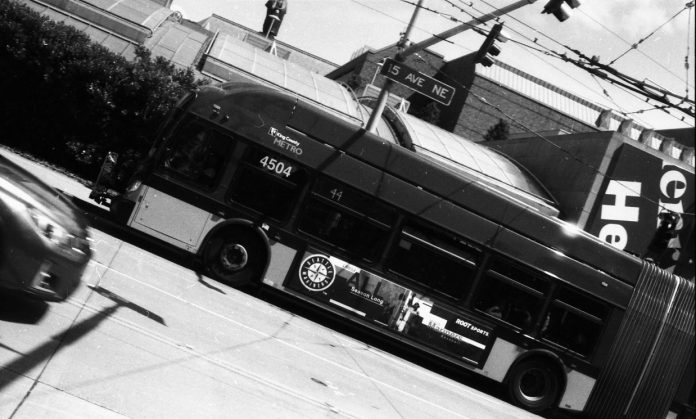The cultures of bus driving here at Metro are many and wide. This job, so much more than others, is exactly what you choose to make of it, and with that amount of self-direction the options are bewildering–limitless, really. Settling for whatever everyone else seems to be doing can become the default, rather than the heady and slightly overwhelming task of deciding what you want your eight hours to look like. It’s easier to just follow along. There are new bus drivers who pretend to be jaded, I think, because it’s what the others are doing. Or who adopt positive attitudes because they see others doing the same. But they can also create their own perspective. It’s very much a solo gig, and your perception dramatically shapes how that spent time feels.
Operators have always worked somewhere previously prior to coming to Metro, and the jobs they’re coming from generally don’t offer such freedom of construction, simply because most jobs don’t really do that. Although there are rules to be followed here (rules far more critical than most occupational regulations), there isn’t a boss standing over your shoulder, deadlines to be met, or a nebulous sense of accomplishment. It’s tactile. It requires initiative. Your contribution is obvious, and your choice of how you interact with the world has immediate ramifications.
As with all jobs and life in general, a positive outlook here in busland requires considered and rigorous focus. Something in your life you don’t like? Either get rid of it; change it; or rewire how you think about it so you like it. It’s the third option that’s typically most available in workplace environments, and it’s certainly true out here on the road. So many conversations I have with my colleagues revolve around us working it out, figuring out how to frame it all, so we can stay sane. It’s a never-ending conversation, the journey of discovering how to be happy, and it takes real work. I think it’s worth every bit of effort.
I was slouching in the front forward-facing seats, yelling back and forth with my compatriot as he drove me home. He and I are both night operators by choice. We love this nutty stuff, and tonight we were talking about “The Fall” (explained here), and how to avoid leaning into a headspace where fare evasion becomes bothersome. Passengers can be divided into three categories: those who can pay bus fare, those who can’t, and those who can but choose not to. It’s this third group that’s the subject of so much internal discussion.
I was passing on a sentiment an administrator at Metro once shared with me: “the thing is, even if they have the money, if they’re bumming rides, they’re probably not doing too well.”
“And you know, they’re still paying!”
“Exactly, sales tax!”
“It’s like, who cares?”
“I know!” I exclaimed, reflecting further. “I think I get into trouble when I take it as a disrespect thing. I can’t let myself take it personally. Because they’re not, that’s not their intent, to personally disrespect this or that operator. They don’t care about that. They’re not thinking about that at all. We think they are, but they’re not.”
“They have bigger problems.”
“Totally.”
He said with a grin, “my goal in life is to not get shot. And I’ve noticed that you don’t get shot when you say hi to people. So I say hi to everybody!”
“That’s a great life philosophy! I’m gonna take that on myself!”
“I’ve said hi to every single person I’ve met. And none of them have shot me!”
We cackled. It was true. Customer service is a stronger weapon than any barrier or tool, and we knew it from experience. He continued, “I think I’m about eighty percent bulletproof. The other–”
“Oh, I think it’s more than eighty percent! You got a good thing goin’!”
“There are days though.”
I spoke my next thoughts aloud, though I think I was hashing out my own issues more than any he may have had. “I want to avoid two things: taking it personally, and having it affect my perspective on people at large. The challenge is we’re seeing all this stuff with absolutely no context. We don’t know what’s goin’ on. It’s not about us.”
“One person having a bad day shouldn’t represent–”
“All of humanity–”
“–how you treat every person you pick up for the next month!”
“Exactly!”
Don’t you love how much mileage a single sentence can bring? His final line was better than I thought it was going to be, and recalling it would help me get through an incident a few days later. I doubt my operator friend had any idea he was giving me the aid I needed. Just an offhanded sentence, tossed out in good company, another night on the way home.
Nathan Vass is an artist, filmmaker, photographer, and author by day, and a Metro bus driver by night, where his community-building work has been showcased on TED, NPR, The Seattle Times, KING 5 and landed him a spot on Seattle Magazine’s 2018 list of the 35 Most Influential People in Seattle. He has shown in over forty photography shows is also the director of nine films, six of which have shown at festivals, and one of which premiered at Henry Art Gallery. His book, The Lines That Make Us, is a Seattle bestseller and 2019 WA State Book Awards finalist.


